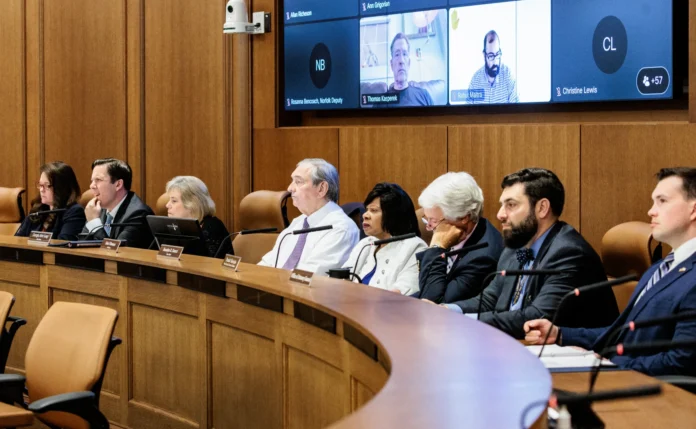Governor Glenn Youngkin’s veto of House Bill HB2277 has been hailed by Virginia Republicans as a critical stand to preserve the integrity of the state’s election processes.
The bill, sponsored by Delegate Joshua Rice (D), aimed to reduce the certification of election results to a mere “ministerial duty” of local electoral board members, imposing a $1,000 fine and potential removal for those who refuse to certify without proving that they have legal cause. Republicans argue that the legislation would block the necessary scrutiny of election results, instead requiring board members to merely rubber-stamp results instead of safeguarding proper and lawful conduct of elections.
Introduced in the 2025 General Assembly session, HB2277 emerged in response to an incident in Waynesboro, where two Republican electoral board members filed a lawsuit in 2024, expressing reluctance to certify results unless ballots were hand-counted. A judge ordered them to fulfill their duties, prompting Rice’s bill to codify certification as a non-discretionary task.
Republicans were appalled that HB2277 was sent to Youngkin’s desk for his signature, pointing out that certification of elections is a primary responsibility entrusted to electoral board members. The bill passed the House on a party-line vote of 51-47.
By vetoing the bill, Governor Youngkin validated Republican concerns that HB2277 would significantly weaken essential checks and balances in fair elections. “The Virginia model for election security works because we prioritize accuracy and accountability,” Youngkin stated in a press release. “This bill risks forcing board members to certify results without addressing legitimate concerns, which could erode public trust in our elections.”
House Minority Leader Todd Gilbert (R-Shenandoah) affirmed the sentiment, calling the bill a “solution in search of a problem.” He argued that existing laws already ensure electoral boards fulfill their duties, as demonstrated by the Waynesboro case, where judicial intervention resolved the issue without new legislation. “HB2277 would have created a chilling effect, punishing board members for raising valid questions about election integrity,” Gilbert said. “The governor’s veto ensures we don’t sacrifice thoroughness for expediency.”
Republicans further contend that the bill’s punitive measures—fines and removal—could discourage qualified individuals from serving on electoral boards, particularly in rural areas where volunteer board members are already scarce. “We need board members who feel empowered to ask tough questions, not ones intimidated by penalties,” said Delegate Nicholas Freitas (R-Culpeper). He pointed to Youngkin’s Executive Order 35, issued in 2024, which codified stringent election security measures like 100% paper ballots, offline counting machines, and daily voter roll updates, as evidence of Virginia’s robust system.
The veto also drew praise from the Virginia Citizens Defense League (VCDL), which advocates for policies that bolster public confidence in elections. “Governor Youngkin’s action prevents a dangerous precedent where dissent or caution could be penalized,” the group stated in a newsletter. VCDL argued that HB2277’s “rubber stamp” approach might have glossed over potential errors or fraud, a concern heightened by national debates over election integrity.
Democrat attempts to neutralize electoral board oversight power increased following the 2020 presidential election, during which Monica Palmer, chair of the Wayne County, MI, Board of Canvassers, after observing that 70% of Detroit’s 134 Absentee Voter Counting Boards did not balance, was subjected to extreme pressure to certify results anyway without making any effort to be satisfied that they were correct. Palmer was told by powerful Biden partisans that her role on the board did not give her authority to do anything other than approve the results, no matter how incorrect or problematic they might appear.
“But, why do we even have electoral boards, if not to help safeguard against potentially false elections?” asked Daniel Brubaker, author of By The People? The 2020 U.S. Presidential Election and Theft of Americans’ Right to Self Rule.
Virginia Democrats have criticized Youngkin’s veto as a politically motivated move to appease skeptics of election processes. Delegate Rice defended his bill, stating it was necessary to prevent delays and ensure timely certification. Democrats warn that the veto could embolden future refusals to certify, potentially disrupting election timelines.
Republicans counter that the veto reinforces Virginia’s commitment to transparency and diligence. “Our elections are secure because we don’t cut corners,” said Senator Mark Obenshain (R-Rockingham). “The governor’s veto protects the right of electoral boards to do their job thoroughly, without fear of being fined or fired for asking questions.”
NEWSLETTER SIGNUP
Subscribe to our newsletter! Get updates on all the latest news in Virginia.



